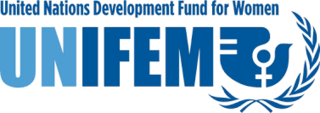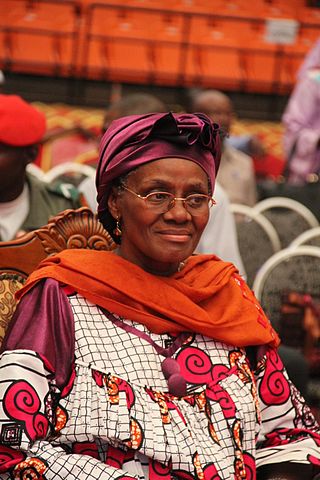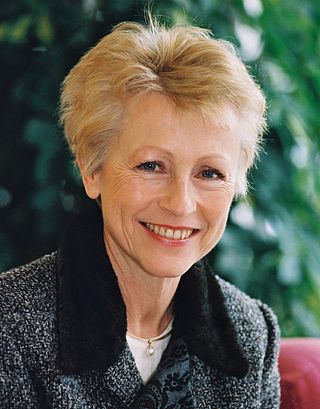Related Research Articles
Gender equality, also known as sexual equality or equality of the sexes, is the state of equal ease of access to resources and opportunities regardless of gender, including economic participation and decision-making; and the state of valuing different behaviors, aspirations and needs equally, regardless of gender.

The United Nations Development Fund for Women was established in December 1976 originally as the Voluntary Fund for the United Nations Decade for Women in the International Women's Year. Its first director was Margaret C. Snyder. UNIFEM provided financial and technical assistance to innovative programmes and strategies that promoted women's human rights, political participation and economic security. Since 1976 it supported women's empowerment and gender equality through its programme offices and links with women's organizations in the major regions of the world. Its work on gender responsive budgets began in 1996 in Southern Africa and expanded to include East Africa, Southeast Asia, South Asia, Central America and the Andean region. It worked to increase awareness throughout the UN system of gender responsive budgets as a tool to strengthen economic governance in all countries. In 2011, UNIFEM merged with some other smaller entities to become UN Women.

Lesbian, gay, bisexual and transgender (LGBT) people in Luxembourg enjoy similar rights to non-LGBT people. Partnerships, which grant many of the benefits of marriage, have been recognised since 2004. In June 2014, the Luxembourgish Parliament passed a law enabling same-sex marriage and adoption rights, which took effect on 1 January 2015. Additionally, discrimination on the basis of sexual orientation and "change of sex" in employment, healthcare and the provision of goods and services is outlawed, and transgender people are allowed to change their legal gender on the basis of self-determination.
Myriam Merlet was a political activist, scholar and economist who served as Chief of Staff of Haiti's Ministry for Gender and the Rights of Women, from 2006 to 2008. One of the particular focuses of her work was on how rape and rape culture is used as a political weapon, and was not considered a criminal offense in Haiti until 2005.
Nicole Péry is a French politician who served as Secretary of State for Women's Rights and Professional Training from 1998 to 2002 under Prime Minister Lionel Jospin. A member of the Socialist Party (PS), she is a professor of literature by occupation.

Marie-Andrée Bertrand was a French-Canadian criminologist, a feminist and anti-prohibitionist.

HeForShe, often referred to as He for She, is a solidarity movement for the advancement of gender equality, initiated by the United Nations. Grounded in the idea that gender inequality is an issue that affects all people, socially, economically and politically, HeForShe is a global effort that seeks to involve men and boys in achieving equality by taking action against negative gender stereotypes and behaviors. Its logo represents the union of women and men working together to achieve gender equality, by joining together aspects of both the female and male symbols.

Marlène Schiappa is a French writer and politician who served as Minister Delegate in charge of Citizenship, attached to the Minister of the Interior, in the government of Prime Minister Jean Castex (2020–2022) and as Secretary of State for Gender Equality in the government of Prime Minister Édouard Philippe (2017–2020).
Hasna Barkat Daoud is a Djiboutian lawyer and former government minister.
Hawa Ahmed Youssouf is a Djiboutian civil servant and politician. In 1999 she was appointed Minister-Delegate for the Promotion of Women, Family and Social Affairs, the first female minister in the country. Four years later she also became one of the first group of women elected to the National Assembly.

Marie-Thérèse Abena Ondoa is a Cameroonian academic and politician. She has been a Minister of Women's Empowerment and the Family since 2009. She was assistant dean in the Faculty of Medicine of the University of Yaounde before her appointment as Minister.
Khadija Abeba is the President of the Supreme Court of Djibouti and is the country's highest ranking female official.

Maud Olivier is a French politician. A member of the Socialist Party, she was a Deputy for the Essonne's 5th constituency, General Councillor for the Canton of Les Ulis and Mayor of Les Ulis.
Safia Elmi Djibril is a Djiboutian politician and women's rights activist.
Jacqueline Berenstein-Wavre was a Swiss politician who spent her political career in Geneva. She fought for women's rights in the workplace.
Annie Sugier is a French nuclear physicist. She came to prominence in 1989 as the first woman to be promoted to a directorship at France's "Alternative Energies and Atomic Energy Commission" . The focus of her responsibilities at the CEA was on the dismantling of nuclear installations. She is better known to many for her role as a committed and eloquent feminist activist. She has served for many years as president of the "Ligue du droit international des femmes", founded in 1983 by her friend and mentor, Simone de Beauvoir.

Lynn Bertholet is a transgender Swiss woman, bank executive and photomodel. She is also co-founder and chairperson of charity ÉPICÈNE, a volunteer public utility body which aims to welcome and support anyone facing transidentity issues.
Feminist foreign policy, or feminist diplomacy, is a concept that calls for a state to promote values and good practices to achieve gender equality, and to guarantee all women enjoy their human rights, through diplomatic relations. The practice was initiated by Margot Wallström, former Swedish Foreign Affairs Minister.

Hadja Idrissa Bah, also Hadja Idy is a child's rights and women's rights activist from Guinea, who was elected President of the Guinean Children's Parliament in 2016. She has advised President Emmanuel Macron on women's issues.

The Ministry on the Status and Rights of Women in Haiti, in French Ministère à la Condition féminine et aux Droits des femmes, abbreviated as MCFDF, is a ministry in Haiti, founded on 8 November 1994 with the mission to work for the emergence of an egalitarian society with equality between men and women.
References
- ↑ "Gender Justice in Djibouti" (PDF). United Nations. Archived (PDF) from the original on 2018-12-20.
- ↑ "Djibouti, Reporting for First Time to Women's Anti-Discrimination Committee, Boasts Progress in Health, Education, Women's Participation in Politics | Meetings Coverage and Press Releases". www.un.org. Retrieved 2019-12-04.
- ↑ "MFF/UNFD : Forum-débat sur les droits de la femme". MFF/UNFD : Forum-débat sur les droits de la femme. Retrieved 2019-12-04.
- ↑ Walugembe, John Baptist (2011). "Social Protection for Women in Business in the IGAD Region". doi:10.13140/RG.2.1.3425.4568.
{{cite journal}}: Cite journal requires|journal=(help) - ↑ "Lettre d'information UE-Djibouti n°5". 2016. Archived from the original on 2020-07-30.
- ↑ "La Banque africaine de développement engagée dans la promotion et l'égalité de genre à Djibouti". African Development Bank - Building today, a better Africa tomorrow. 2019-04-26. Retrieved 2019-12-04.
- ↑ "DJIBOUTI : Saïd Del Wais left alone at helm of HALT Group". The Indian Ocean Newsletter. 2019-11-29. Retrieved 2019-12-04.